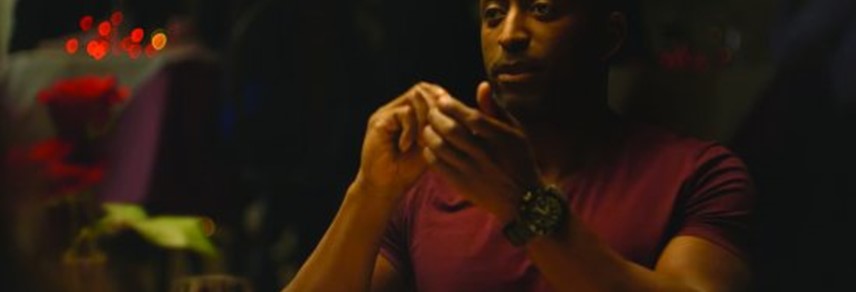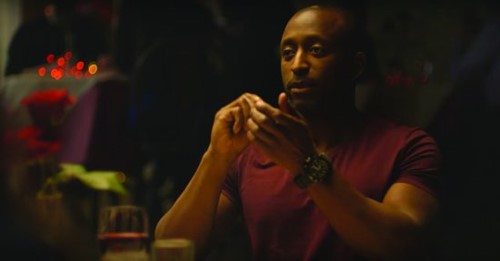
HEART'S DESIRE
Using film to encourage open dialogue about organ donation led to NHS Blood and Transplant’s cringeworthy, hilarious and exceedingly awkward #SharetheLove film series. Brittany Golob reports
 Romance is awkward. Dating is awkward. Valentine’s Day is awkward. Organ donation is awkward. Yet, that final point is the very one the NHS Organ Donation division within NHS Blood and Transplant (NHSBT) is trying to change. One of the main challenges the NHSBT faces is not getting people to join the Organ Donation Register, but in encouraging registered donors to tell their loved ones about their decision. “If [families] didn’t know the decision, it makes it very difficult to allow their organs to be used,” says Nick Dutnall, head of health at storytelling communications agency Aesop, which worked with NHS Organ Donation to encourage this practice.
Romance is awkward. Dating is awkward. Valentine’s Day is awkward. Organ donation is awkward. Yet, that final point is the very one the NHS Organ Donation division within NHS Blood and Transplant (NHSBT) is trying to change. One of the main challenges the NHSBT faces is not getting people to join the Organ Donation Register, but in encouraging registered donors to tell their loved ones about their decision. “If [families] didn’t know the decision, it makes it very difficult to allow their organs to be used,” says Nick Dutnall, head of health at storytelling communications agency Aesop, which worked with NHS Organ Donation to encourage this practice.
The partnership resulted in a series of three videos that ran in a social media campaign, called #SharetheLove, around Valentine’s Day. The films depict 12 awkward Valentine’s dates in which couples share intimate, strange or revolting details about themselves. Dutnall says about the objective, “We wanted to make sure that people saw their organ donation decision as a really normal thing. Some things are better left unsaid, but your organ donation decision shouldn’t be one of them.”
Transparency around organ donation decisions is a key message for NHS Organ Donation. Since 2010, its research shows, 1,200 people have missed out on life-saving transplants due to over 500 families overriding their loved one’s decision to become a donor. Sally Johnson, director of organ donation and transplantation at NHSBT, said in a release, “We want to draw attention to the fact that while most families approached about donation support their relative’s decision to donate as recorded on the Organ Donor Register, a number of families each year override a previously made donation decision. We hope that by raising this issue we will prompt more families to talk about donation and reduce the number of families overriding their relative’s decision to donate.”
The videos, which rolled out the week before 14 February, have accumulated over 1m Facebook views and resulted in the doubling of the year-on-year amount of donor registrations for that week. People both already engaged with and unfamiliar to the organisation engaged on social media.
Yet, the film series was not necessarily an easy decision. Dutnall says one of the members of the social media team from NHSBT attended a talk on health that Aesop held in 2014 and decided to pursue a project with a more narrative approach than was typical for the organisation. The resulting film series was born from that inspiration. “I think they’ve seen it as a real eye-opener to the power of using narrative techniques and using storytelling in this way,” Dutnall adds.

Ceri Rose, assistant director of digital and marketing for the NHSBT says, “We hope they will make a real impact on getting more people taking about organ donation with their loved ones. The films are a different approach for us and are part of our efforts to normalise conversations about organ donation.”
The first step, however, was for Aesop to determine the core message NHS Organ Donation wanted to communicate. The idea of things left unsaid led to the concept of awkward romantic encounters. “We thought it’d be interesting to play off all these really horrendous things that people might come out with on a date; while actually saying to someone that you’ve signed up to the Organ Donation Register is not as horrendous as these,” says Dutnall.
Some of the situations in the three films are fairly horrendous. One woman breaks into a spirited rendition of Miley Cyrus’ ‘Wrecking Ball,’ while others share details about their toilet habits and one man relates, “I was breast fed until I was 11.” The comedy that shines through these awkward dates is made possible partially because of the films’ style. The setting is fairly straightforward and features a restaurant scene with candles and roses. The waiters are mostly unseen and the focus is honed to a single table at a time.
With three cameras in use – one to get an establishing view of the diners at the table and one per diner – the shot jumps back and forth between the awkward oversharer and his or her dining companion. The reactions are honest and genuine and allow the viewer to relate to that situation. Though the campaign was driven by Valentine’s Day, Dutnall says the actual dates were relatable enough to evoke the feeling of being on a first date or simply out with a partner.
The 12 dates that feature across the three films were shot with 24 actors over a single day, to save time and money on production. The actors were chosen to become part of a pair and, at the request of the NHSBT, depicted a mix of ethnicities, ages and sexual orientations. Some of their on-screen awkward moments were scripted, but many were not as actors were allowed to ad lib and chat more organically, which led to some of the film’s “beautiful moments,” says Dutnall.
The humour derived from these cringeworthy moments may be what made the films such a success on social media. The target audience was mostly young people, thus an emotional response that would prompt sharing was essential. Humour also allowed the NHSBT to approach communications in a new way. Organ donation is not typically talked about as a laughing matter. By the very nature of the subject, it is oriented around a taboo. The topic of death is not the standard dinner date fare, yet neither are one’s personal grooming habits, penchant for cat rearing or inappropriate talents. But by normalising the discussion about organ donation, the NHSBT can work toward its goal of encouraging transparency.
The wider healthcare and pharmaceuticals sector has not traditionally featured the same kind of creative, experimental communications that FMCG or digital brands favour. “Healthcare and pharmaceuticals brands have shied away from film,” Dutnall says, “Because they feel that it is too far away from the brand itself. But, a different approach can still point back to a brand or organisation in a very powerful way and make it stand for more than it did previously.” Dutnall says the internal reaction has been positive as well and NHSBT is discussing future narrative- focused communications.



